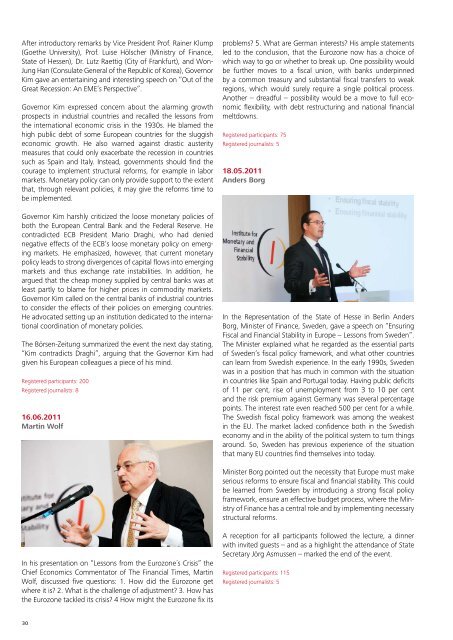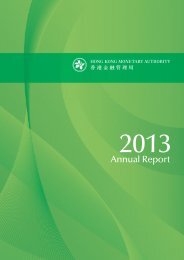IMFS_2009_to_2013_web
IMFS_2009_to_2013_web
IMFS_2009_to_2013_web
Create successful ePaper yourself
Turn your PDF publications into a flip-book with our unique Google optimized e-Paper software.
After introduc<strong>to</strong>ry remarks by Vice President Prof. Rainer Klump<br />
(Goethe University), Prof. Luise Hölscher (Ministry of Finance,<br />
State of Hessen), Dr. Lutz Raettig (City of Frankfurt), and Won-<br />
Jung Han (Consulate General of the Republic of Korea), Governor<br />
Kim gave an entertaining and interesting speech on “Out of the<br />
Great Recession: An EME’s Perspective”.<br />
Governor Kim expressed concern about the alarming growth<br />
prospects in industrial countries and recalled the lessons from<br />
the international economic crisis in the 1930s. He blamed the<br />
high public debt of some European countries for the sluggish<br />
economic growth. He also warned against drastic austerity<br />
measures that could only exacerbate the recession in countries<br />
such as Spain and Italy. Instead, governments should find the<br />
courage <strong>to</strong> implement structural reforms, for example in labor<br />
markets. Monetary policy can only provide support <strong>to</strong> the extent<br />
that, through relevant policies, it may give the reforms time <strong>to</strong><br />
be implemented.<br />
Governor Kim harshly criticized the loose monetary policies of<br />
both the European Central Bank and the Federal Reserve. He<br />
contradicted ECB President Mario Draghi, who had denied<br />
negative effects of the ECB’s loose monetary policy on emerging<br />
markets. He emphasized, however, that current monetary<br />
policy leads <strong>to</strong> strong divergences of capital flows in<strong>to</strong> emerging<br />
markets and thus exchange rate instabilities. In addition, he<br />
argued that the cheap money supplied by central banks was at<br />
least partly <strong>to</strong> blame for higher prices in commodity markets.<br />
Governor Kim called on the central banks of industrial countries<br />
<strong>to</strong> consider the effects of their policies on emerging countries.<br />
He advocated setting up an institution dedicated <strong>to</strong> the international<br />
coordination of monetary policies.<br />
The Börsen-Zeitung summarized the event the next day stating,<br />
“Kim contradicts Draghi”, arguing that the Governor Kim had<br />
given his European colleagues a piece of his mind.<br />
Registered participants: 200<br />
Registered journalists: 8<br />
16.06.2011<br />
Martin Wolf<br />
problems 5. What are German interests His ample statements<br />
led <strong>to</strong> the conclusion, that the Eurozone now has a choice of<br />
which way <strong>to</strong> go or whether <strong>to</strong> break up. One possibility would<br />
be further moves <strong>to</strong> a fiscal union, with banks underpinned<br />
by a common treasury and substantial fiscal transfers <strong>to</strong> weak<br />
regions, which would surely require a single political process.<br />
Another – dreadful – possibility would be a move <strong>to</strong> full economic<br />
flexibility, with debt restructuring and national financial<br />
meltdowns.<br />
Registered participants: 75<br />
Registered journalists: 5<br />
18.05.2011<br />
Anders Borg<br />
In the Representation of the State of Hesse in Berlin Anders<br />
Borg, Minister of Finance, Sweden, gave a speech on “Ensuring<br />
Fiscal and Financial Stability in Europe – Lessons from Sweden”.<br />
The Minister explained what he regarded as the essential parts<br />
of Sweden’s fiscal policy framework, and what other countries<br />
can learn from Swedish experience. In the early 1990s, Sweden<br />
was in a position that has much in common with the situation<br />
in countries like Spain and Portugal <strong>to</strong>day. Having public deficits<br />
of 11 per cent, rise of unemployment from 3 <strong>to</strong> 10 per cent<br />
and the risk premium against Germany was several percentage<br />
points. The interest rate even reached 500 per cent for a while.<br />
The Swedish fiscal policy framework was among the weakest<br />
in the EU. The market lacked confidence both in the Swedish<br />
economy and in the ability of the political system <strong>to</strong> turn things<br />
around. So, Sweden has previous experience of the situation<br />
that many EU countries find themselves in<strong>to</strong> <strong>to</strong>day.<br />
Minister Borg pointed out the necessity that Europe must make<br />
serious reforms <strong>to</strong> ensure fiscal and financial stability. This could<br />
be learned from Sweden by introducing a strong fiscal policy<br />
framework, ensure an effective budget process, where the Ministry<br />
of Finance has a central role and by implementing necessary<br />
structural reforms.<br />
In his presentation on “Lessons from the Eurozone´s Crisis” the<br />
Chief Economics Commenta<strong>to</strong>r of The Financial Times, Martin<br />
Wolf, discussed five questions: 1. How did the Eurozone get<br />
where it is 2. What is the challenge of adjustment 3. How has<br />
the Eurozone tackled its crisis 4 How might the Eurozone fix its<br />
A reception for all participants followed the lecture, a dinner<br />
with invited guests – and as a highlight the attendance of State<br />
Secretary Jörg Asmussen – marked the end of the event.<br />
Registered participants: 115<br />
Registered journalists: 5<br />
30



